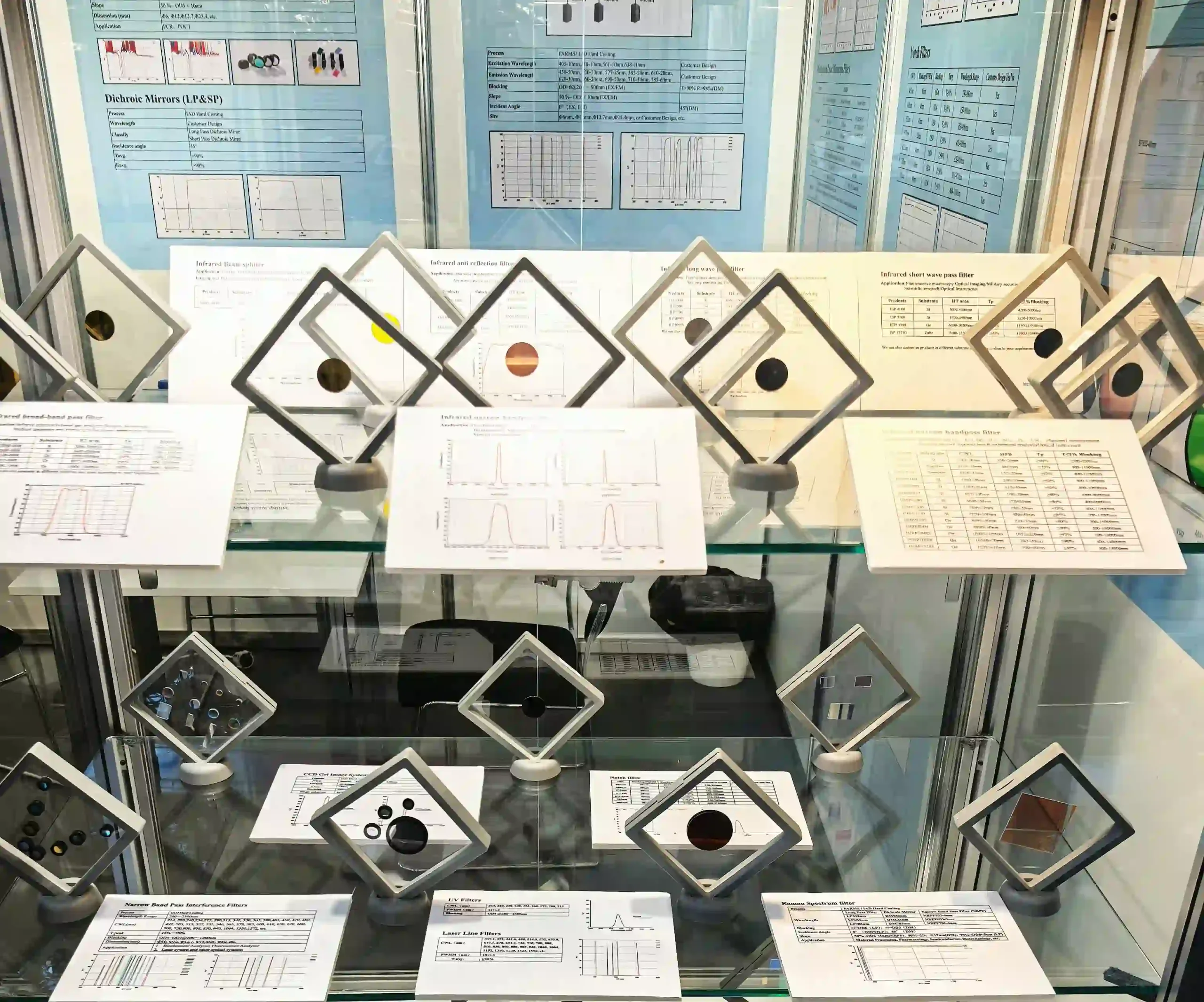Infrared filters are key to tech that needs clear signals, from night vision to sensors. They ensure devices capture the right light wavelengths, cutting through noise for reliable performance over time.
An infrared filter, typically a coated substrate, lets specific infrared wavelengths pass while blocking others. Short wave pass filters, like those from Bodian Optical, allow shorter infrared rays through, stopping longer ones to reduce heat or glare. This sharpens outputs for cameras or detectors, avoiding errors from stray signals.

These filters excel long-term by resisting temperature swings and humidity. High transmittance—often over 90%—stays steady, reducing signal loss and replacements. In security or medical fields, this means less downtime and consistent data, even in tough conditions.
Bodian Optical, with over 40 years of expertise, crafts filters tailored for real-world durability and precision.
Choosing materials for infrared filters means focusing on transmission, blocking, and endurance. Substrates and coatings work together to deliver results that hold up.
Silicon, germanium, and zinc selenide are top picks. Silicon suits mid-range 3-5 micron wavelengths, handling heat up to 120°C. Germanium covers 2-14 microns, pairing well with anti-reflective coatings. Zinc selenide, moisture-resistant, spans 0.6-20 microns. Bodian uses silicon for ISP5100, germanium for ISP10900, and ZnSe for ISP12750, ensuring lightweight, durable solutions.
Coatings use dielectric or metal layers to control light via interference. Vacuum evaporation builds precise stacks for sharp cutoffs; magnetron sputtering adds dense, adherent films. Bodian’s hybrid tech achieves 90% transmittance and 99.9% blocking beyond cutoffs, minimizing scatter and ensuring coatings stick for years.
Durability seals the deal, keeping filters functional under stress.
Heat, humidity, and wear test filters. Low thermal expansion—like germanium on matched mounts—avoids cracks. Bodian’s filters, stable from -50°C to 200°C, use hard coatings to resist scratches, aging gracefully in tough settings.
With materials set, selecting the right filter means balancing key criteria for your needs.
Picking filters hinges on performance, stability, and value, tailored to your application.
Aim for 90%+ transmittance and OD3+ blocking (under 0.1% leakage). Bodian’s ISP5100 passes 3.7-4.9 microns at 90%, blocking 5.25-10 microns. Narrow bandwidths fit lasers; broader ones suit imaging. Steep edges reduce stray light, confirmed by spectrometer tests.
Filters must endure. Top choices hold 90% transmittance after 500 thermal cycles or humidity tests. Germanium-based ISP10900 thrives in damp labs; silicon suits dry zones. Bodian’s coatings drift less than 0.5% yearly, with edge seals blocking moisture.
Durable filters save money by lasting longer. Bodian customizes sizes (5-100mm) and wavelengths affordably, thanks to in-house production. This cuts waste, keeping costs low for bulk or bespoke orders.
Bodian’s short wave pass filters meet these standards, built for demanding tasks.

Bodian’s infrared short wave pass filters deliver precision and staying power for high-stakes uses.
The ISP5100, on sapphire, covers 3.7-4.9 microns at 90% transmittance, blocking 5.25-10 microns below 1%. Thin and temp-stable, it’s ideal for fluorescence microscopy, cutting long-wave noise for sharp contrast. It’s cost-effective for labs or military setups.
On germanium, the ISP12750 spans 7.4-12.5 microns at 85% transmittance, blocking 13-15 microns. Built for thermal imaging in security cams, it handles humidity and field abuse, delivering steady results for gas analysis or surveillance.
The ISP10900, using silicon, passes 3-8 microns at 90%, blocking 10-15.5 microns. Its steep edge suits multi-spectral instruments, ensuring clear signals in night vision or research. Bodian’s coatings guarantee long-term reliability.
ISP5100 excels for shorter waves on a budget sapphire base, ideal for labs. ISP12750’s germanium handles wet environments with broader coverage. ISP10900’s silicon balances both, shining in tough settings. All offer OD3+ blocks and -50 to 200°C stability. Choose by wavelength: short for labs, long for surveillance.
These filters power critical applications across industries.
Bodian’s filters deliver clarity where precision is non-negotiable.
In security, filters like ISP12750 sharpen night cams, passing mid-IR to spot targets 500m out while blocking far-IR noise. Drones and sensors rely on its 24/7 uptime, unfazed by dew or dust.
For gas or pollutant tracking, ISP5100 isolates methane signals in air quality sensors. Its stable coatings hold calibration for months, supporting portable farm or city monitors.
ISP10900 blocks excess IR for clear medical thermal scans, highlighting inflammation. In factories, it steadies machine vision against heat haze, ensuring flawless defect detection.
Bodian’s blend of tech and service keeps these applications running smoothly.
Bodian combines smart design with practical support for projects that can’t afford downtime.
Their interference layers hit OD3 blocks and 90%+ transmittance, matching pricier rivals. Evaporation and sputtering ensure uniform, pinhole-free coatings. Temp resilience (-50 to 200°C) supports aerospace to biotech apps.
Bodian delivers samples in weeks, scaling to full runs. They handle custom sizes, with consults to avoid integration snags. It’s a partnership built on 40 years of know-how.
A military rig with ISP10900 cut false alarms 40%, holding 92% transmittance after 1,000 cycles. An ISP5100 gas analyzer logged 99.8% uptime over two years, with 0.2% drift. Tests confirm deep blocks and bright passes.
Smart material choices make Bodian’s filters a long-term win.
Infrared filters rely on materials like silicon or germanium, coated for precision and endurance.
Match substrates to wavelengths—silicon for mid-IR, germanium for longer ranges. Seek 90%+ transmittance and OD3 blocks. Customize early with integrated makers like Bodian.
With 40 years, ISO certifications, and advanced tools, Bodian’s ISP series offers sharp edges and rugged builds, cutting costs and downtime.
Hybrid substrates and nano-coatings will tighten bands and add toughness. Bodian’s R&D eyes 5G sensors and smart city apps, keeping IR filters ahead.
Q1: What’s the best substrate for mid-IR short wave pass filters?
A: Silicon works well for 3-5 microns—affordable and heat-tolerant. Germanium suits longer waves. Bodian’s ISP5100 on silicon is great for mid-IR.
Q2: Can Bodian customize a filter’s cutoff?
A: Yes—they tweak to 10nm of your target, from prototype to production, fast.